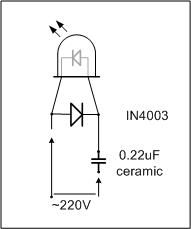Zone valves, Boiler, pump etc.
I can get the 220V 'ON' for each part easily enough .... want a simple way to have an LED indicate state ... illuminated = ON
Did a bit of Googling a round and many people use ccts and just drop power across a resistor ... eg http://www.youtube.com/watch?v=iXMjzlS1Jf8
not practical as heat dissipation of 19 of these is too much.
Found a more detailed cct .. here where capacitor almost removes any power drop across resistor.
Details & explanations are here http://www.marcspages.co.uk/tech/6103.htm
However one location seems to be saying you can drop the resistor all together and just use capacitor to limit current ...

Discussed here - http://www.instructables.com/id/LED-on-AC-Mains/
I'd be interested in simplest way to implement, without the heat dissipation issue. Could the last option be slightly modified without going for full wave rectification ?

